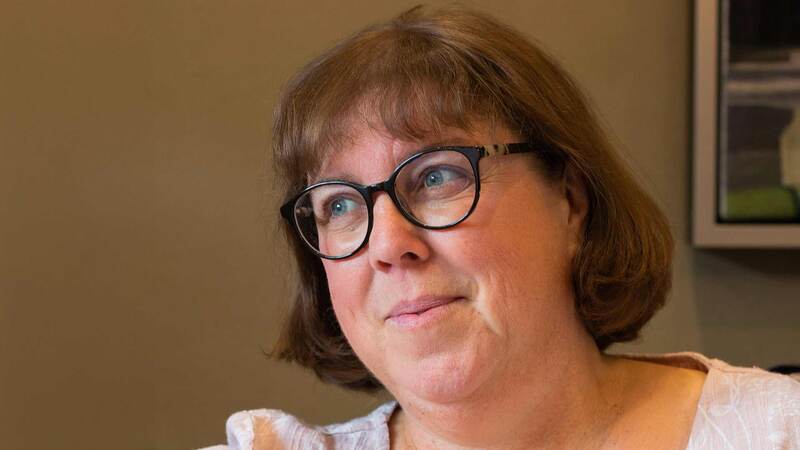You are viewing your 1 free article this month. Login to read more articles.
Ishiguro wins the Nobel Prize in Literature
Kazuo Ishiguro has won the 2017 Nobel Prize in Literature for his novels of "great emotional force".
The prize organisers said the Japanese-born British writer's novels, published by Faber in the UK, "uncovered the abyss beneath our illusory sense of connection with the world”.
The winner of the £832,000 prize, given for outstanding contributions in literature, was announced by permanent secretary Sara Danius at the Swedish Academy in Stockholm, Sweden, this afternoon (5th October).
Ishiguro said the news was "amazing" and "totally unexpected", adding: "It comes at a time when the world is uncertain about its values, its leadership and its safety. I just hope that my receiving this huge honour will, even in a small way, encourage the forces for goodwill and peace at this time."
Danius praised Ishiguro as a “wonderful and truly exquisite” writer, naming her favourite of his titles The Buried Giant and Remains of the Day.
“If you mix Jane Austen and Franz Kafka, then you’ll get Kazuo Ishiguro in a nutshell," she said. "But you have to add a little bit of Marcel Proust into the mix, stir but not too much, and then you have his writing. At the same time, he’s a writer of great integrity, he doesn’t look to the side, he’s developed an aesthetic universe of his own.”
Discussing his use of pathos as a balm to today’s “troubled times”, Danius said: “He is someone who is very interested in understanding the past, but he’s not a Proustian writer, he’s not out to redeem past, he explores what you have to forget in order to survive in first place as an individual and society.”
A Faber spokesperson said the company was "absolutely delighted" with the news. "Kazuo Ishiguro's work has been an inspiration for millions of readers around the world, and his extraordinary fiction will be read for generations to come," the spokesperson said.
Peter Straus, m.d of Rogers, Coleridge & White, who represents Ishiguro, revealed a "great cheer" went up in the agency's office when the winner was announced and he thought of Ishiguro's original agent, Deborah Rogers, who died in 2014.
Straus said: "Rogers, Coleridge & White is delighted and immensely proud to hear that Kazuo Ishiguro has won the Nobel Prize in Literature. A great cheer went up in the office when the news was announced and my thoughts went to Deb, who represented Ish from the start – how full of joy she would be today."
He added: "All of Ish’s publishers around the world – he is published in 50 languages – join with us to offer him our heartfelt congratulations."
Ishiguro triumped over competition from the bookies' favourite Canadian author Margaret Atwood, who usurped Kenyan novelist Ngugi Wa Thiong'o (4/1) as favourite to win at Ladbrookes with odds at 7/2, Japan’s Haruki Murakami (5/1), Spanish novelist Javier Marias (8/1), and South Korean poet Ko Un (8/1).
He has sold 1.67 million books for £11.9m through Nielsen BookScan’s Total Consumer Market. His biggest seller is Never Let Me Go with the paperback selling 306,246 copies while his 1989 Man Booker Prize winner Remains of the Day has sold 149,421 copies across all editions since 1998.
Remains of the Day was later adapted into a film of the same name and Never Let Me Go had a big screen adaptation in 2006.
He spoke to The Bookseller in 2015 about his first novel in a decade, The Buried Giant (Faber), and described how winning the Man Booker aged 35 in 1989 affected him. He said: “When I won, there was just relief. I was given license to think more adventurously, to think more broadly about where I wanted to go next, and to take risks. I really did want the chance to write a few books that didn’t have to be perfect.”
He discussed the influences of Philip Roth and Cormac McCarthy, who also flourished later in their careers. Of his other inspirations, he said: “I think about Gordon Strachan, Ian Callaghan and even Diego Maradonna."
His first novel was published when he was 28. The London-based author has written six novels and his work has been translated into more than 40 languages.
In 1995 he received an OBE for Services to Literature, and in 1998 the French decoration of Chevalier de L’Ordre des Arts et des Lettres.
The author was born in Nagazaki, Japan, in 1954 and came to Britain six years later. He worked as a grouse-beater for the Queen Mother at Balmoral before studying English and Philosophy at the University of Kent, and later became a community worker in Glasgow.
In July last year year, he called for a second referendum on the UK's membership of the European Union to “define the mandate that comes out of last week’s unfocused result”, while arguing that the country “cannot afford to be ruled by anger or self-righteousness”. He talked later to the Financial Times about how he had been “angry” about the result.
US singer-songwriter Bob Dylan took home last year’s prize for "having created new poetic expressions within the great American song tradition”. It took two weeks for Dylan to accept the call from the academy, when he said he was left “speechless”.
When asked whether she thought Ishiguro’s win was less controversial than Dylan’s last year, Danius said it was “not for [her] to judge”.
“We’ve chosen what we think is an absolutely brilliant novelist”, she added.

















